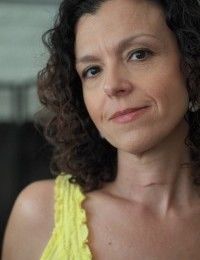By now you probably know the story: an English professor awakens to find, like Kafka's Gregor, that he has turned into something unthinkable, something so unlike who he was. In this case not a beetle but a breast. Young, perfectly round, its nipple erect. What if he had woken to find himself a breast at ease in middle age, its nipple sure of its opinion but not in constant need to give it? In this room with a turret, the inspiration for the story, you are not turned on, but troubled by the memory of your mother in her last years pushed around in a wheelchair entirely braless. Did it feel like freedom or resignation to no longer have to roust the girls up and about, or make them unwilling interlocutors? You think for the nursing home this was mainly convenience. With so much to do, why harness old women who've wandered off a darkened stage? Your mother who would never answer the door without a girdle, much less a bra. What if the breast had been delicate and shallow, a bead of water trembling on the paddle of a thirsty cactus? Flat as a mesa, scarred like an arroyo? Or why not two breasts, one a full cup larger than the other from having nursed too long in the same position while writing recommendation letters? Above the desk the concentric circles of a white domed ceiling punctuated in the center by a round light that tear drops into a nipple, and around the nipple an areola of desiccated insects drawn to its luminous glands. One understands when entering a room that others have been there before you. But this room is never just itself, it is always a story that hovers over your own. What if the nipple had sprouted a hair, and given the professor’s lack of hands, remained forever unplucked? What if the nipple had been inverted, and not, as the story goes, phallic? A breast leaking milk, its infected ducts hard and throbbing under a cabbage leaf? The domed ceiling has two cracks like veins under pale skin. On the roof, where the turret lives, is another breast whose nipple pulls energy from the center of the desk to its weathervane. It's hard to get a signal beneath it, you have to sit on the bed to text a friend whose father died yesterday. I didn't get a chance to say goodbye, she writes. And, fuck capitalism. Perfectly framed by the window to your left is a long thin tree among a thicket, that pushes proudly from its trunk what looks like a breast, because now everything does, but is actually a scar over a wound called a burl, the result of some type of stress: injury, virus, fungus. Valued for its beauty, this type of scar is often poached, destroying the tree it was trying to protect. A Redwood can sprout another Redwood from its burl if it thinks it might die. The women in your family, their breasts at any age fall sideward. They never point to future or sky, but each, after sex, are waterfalls into canyons.
